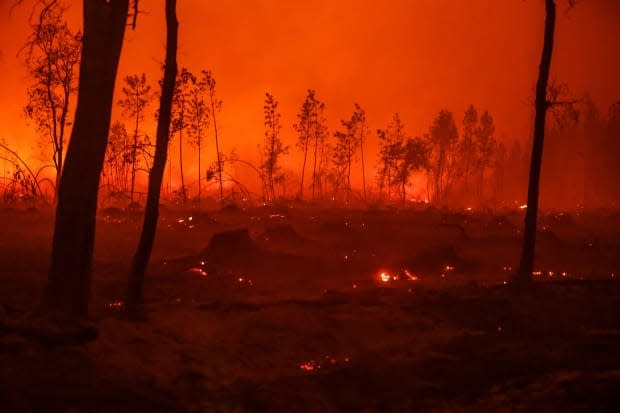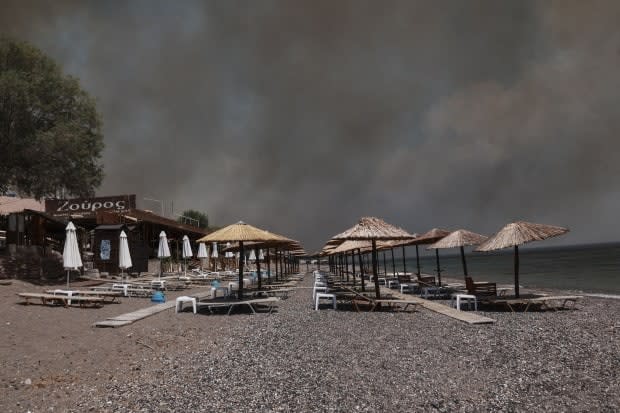How extreme weather could force travellers to revamp their vacation plans — now and in the future

A recent trip to Europe marked a first for Amanda Jacobsmeyer as she travelled in the summer rather than during a cooler time of year.
"It was very hot," said Jacobsmeyer, a New Yorker who visited northern Italy, southern France and Monaco over eight days in July.
In Monaco, the mercury went high enough for a fellow traveller in Jacobsmeyer's tour group to reveal that she and her family would skip a week-long stretch of their trip due to temperatures stretching past the 30 C mark.
"I'm far too cheap to cancel a vacation I've already paid for," said Jacobsmeyer, who nonetheless sees logic in having a limit when it comes to heat.
Europe has seen multiple waves of sweltering heat this summer, topping records in some cases. Parts of the continent have faced severe drought conditions — and wildfires have torn through forests and forced people to flee homes, campgrounds, and resorts.
Travel industry experts say the continent has dealt with bouts of extreme weather in the past, but these challenges have the potential to shift where and when people travel as they become more frequent amid our changing climate.
Having to adjust
In southwestern France this week, firefighters were trying to quell a major wildfire in the Gironde region — just like they were last month. The country is now also facing its worst-ever drought and fourth heat wave this year.
Do you have a question about climate change and what is being done about it? Send an email to ask@cbc.ca

Frédéric Dimanche, director of the Ted Rogers School of Hospitality and Tourism Management at Toronto Metropolitan University, said the country has dealt with wildfires in the past — particularly in the more fire-prone south — though not with the combined scale and frequency of the problems this year.
"The consequences of those fires seems to be greater than ever before," said Dimanche, who's originally from France and keeps up with the news there.
WATCH | Demand for air conditioning surges in U.K. amid summer heat waves:
He said it's too soon to tell how tourists will make their vacation plans in future, but some tourism operators are signalling they will be making adjustments.
Dimanche heard an interview with the owner of a campground destroyed by a recent fire near Arcachon, France.
The owner planned to rebuild his facility, with an eye toward a more environmentally sustainable setup. But he was optimistic about the future.
"Never in this interview was there talk of giving up," said Dimanche. "He is still counting on people to come back next year."
Heat, yes. Too much heat, no
Dimanche said this part of France and the wider Mediterranean Basin region draw sun seekers from other parts of the continent for vacations, whether they travel by car, train or plane.
And like their fellow tourists from abroad, these vacationers are there to enjoy the heat.
"It's pretty much sun — guaranteed for the whole summer," he said.

Mary Chao can vouch for the strength of the sun in southern France well before the official start of summer, like when she and her husband went to the French Riviera in May.
"By afternoon, it was just scorching heat," said Chao, a journalist who lives in New Jersey.
Chao said coping with the kind of extreme heat that has followed later in the summer would have made her "miserable."
Climate scientist Dominic Royé, a postdoctoral fellow at the University of Santiago de Compostela in Spain, said the broader Mediterranean region is warming 20 per cent faster than the global average.
"If you think about how much tourist activities depend on weather conditions, you can imagine the potential impact [on tourism]," Royé said in an email.

The European Travel Commission (ETC), which represents more than 30 national tourism organizations, says it does not have data on how the extreme weather plaguing the continent is affecting tourists' decisions this year.
"Sporadic adverse weather conditions are unlikely to affect the majority of tourists' immediate travel behaviours," the ETC's executive unit said via email.
But if such conditions "persist into the long term," the ETC believes, there could be change on the horizon — potentially in the form of people choosing to travel to other places or to go on holiday at times of the year when the heat is less intense.
In Italy this summer, tourists visiting Lake Garda, where the water level has dropped dramatically, are getting a glimpse of how extreme weather can impact their travel and leisure activities.
Rocks that were previously under water are now exposed and ring the Sirmione Peninsula, far beyond the normal shoreline. The water that sits beyond that is several degrees above its normal temperature — almost matching the average of the Caribbean Sea.
Garda Mayor Davide Bedinelli has said the tourist season is going better than expected, despite cancellations from travellers during a July heat wave.
"Drought is a fact that we have to deal with this year, but the tourist season is in no danger," he wrote on Facebook last month.
More focus on risk
Dimanche points out that people travelling abroad this summer have had to make their plans amid the continuing backdrop of a global pandemic.

He believes that same thinking process could become a bigger part of how people plan their trips in the future.
"I think increasingly, we are going to have to take into consideration risk assessment for weather and climate change," said Dimanche.
That could be a factor for travel and tourism operators as well; Dimanche said they'll have to consider the risks their clients could face.
Víctor Resco de Dios, a professor of forestry at the University of Lleida in Spain, sees wildfires as a specific area of risk that needs to be addressed.
"The tourist sector must adapt quickly," Resco de Dios, who sees rising threats for tourism as wildfires worsen, said in an email.
Resco de Dios said it's a particular concern for tourist destinations that border forests. Steps need to be taken to mitigate the fire risks, in part by reducing the tree cover, so there is less fuel for future wildfires, he said.
"I don't think people are aware that their holiday place may become a mousetrap under fire," said Resco de Dios, who believes governments should publish maps that indicate whether a place is fire safe or not.
"This way, tourists can make informed decisions on the risk they are taking with their holiday destination."


 Yahoo Movies
Yahoo Movies 